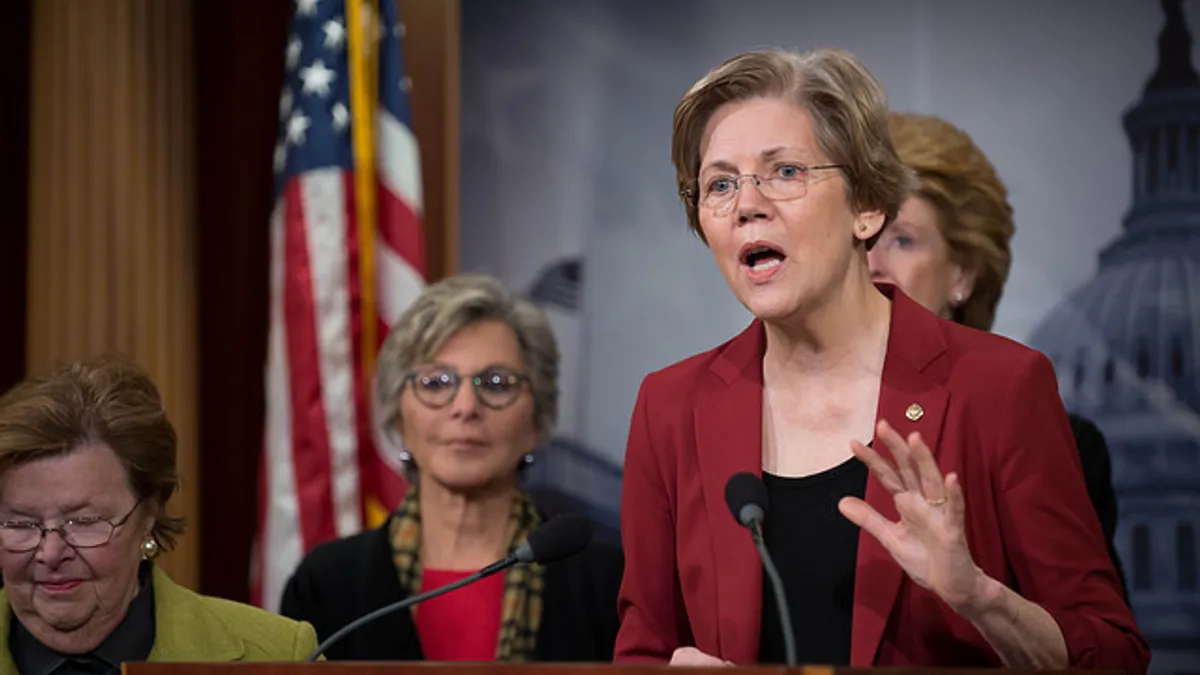UPDATED, Nov. 13, 2018: Sen. Elizabeth Warren has introduced the American Housing and Economic Mobility Act to the House as a companion to the Senate bill introduced in September, according to Curbed.
"The American Housing and Economic Mobility Act confronts the shameful history of government-backed housing discrimination and is designed to benefit those families that have been denied opportunities to build wealth because of the color of their skin," Warren said during a press conference.
Curbed reports that while the House and Senate bills are seemingly identical, the legislation has a better chance of moving forward in the House than the Senate due to the Democratic House majority in 2019.
Dive Brief:
- U.S. Senator Elizabeth Warren, D-MA, has introduced a Senate bill, the American Housing and Economic Mobility Act of 2018, to address the housing affordability crisis. The bill would invest about $475 billion in a number of federal programs over 10 years. The funding would go toward preserving or creating an estimated 3.2 million affordable housing units, which would lower rents by 10% and create 1.5 million jobs, according to an independent analysis from Moody's Analytics.
- The bill would change existing laws that protect discriminatory housing practices and perpetuate segregation. For example, the bill aims to expand the Fair Housing Act to prohibit housing discrimination on the basis of sexual orientation, gender identity, marital status and income source. It also provides incentives for local jurisdictions that rework zoning laws that inhibit new housing construction.
- The bill would be funded by raising the estate tax to its level at the end of the George W. Bush administration, as well as progressive taxes, which "will affect only about 10,000 of the wealthiest families in the country," Warren said in a statement.
Dive Insight:
Cities and their surrounding metropolitan areas rapidly have been adopting different measures in an attempt to stem the tide of the spreading housing affordability crisis. But Warren's legislation recognizes the widespread nature of the problem and would provide relief throughout the country.
"Housing is the biggest expense for most working families — and costs for everyone, everywhere are skyrocketing," Warren said in a statement. "This proposal will attack the rising cost of housing by helping to roll back needlessly restrictive local zoning rules and taking down other barriers that keep American families from living in neighborhoods with good jobs and good schools."
Like many local-level measures, this bill would channel money toward programs to rehabilitate, preserve and build additional housing units to increase capacity, which is a major contributing factor to the problem. Like other supply-and-demand-based markets, it's believed that increasing the availability of housing units will lower the cost, in this case by an estimated 10%.
But this bill doesn't merely dump money into increasing capacity. It also directly addresses inequity in housing practices. In addition to the Fair Housing Act changes, the bill would provide assistance to people hurt by existing or previous federal housing regulations, dating back to the 1960s when the federal government denied mortgage subsidies for black families. The measure also would provide support for people whose housing wealth was decimated by the housing crisis a decade ago, which disproportionately affected people of color. If passed into law, this legislation reportedly would help close the housing gap between white and black families. Plus, it would provide $2 billion to create about 200,000 homes on Native American tribal land.
The ambitious legislation's future might depend on what happens with the mid-term elections in about a month and a half. The Atlantic says "it has no chance of passing a Republican-controlled Congress" because it would raise the estate tax. The article suggests that the bill could at least be seriously considered if Democrats take at least one branch of Congress.












